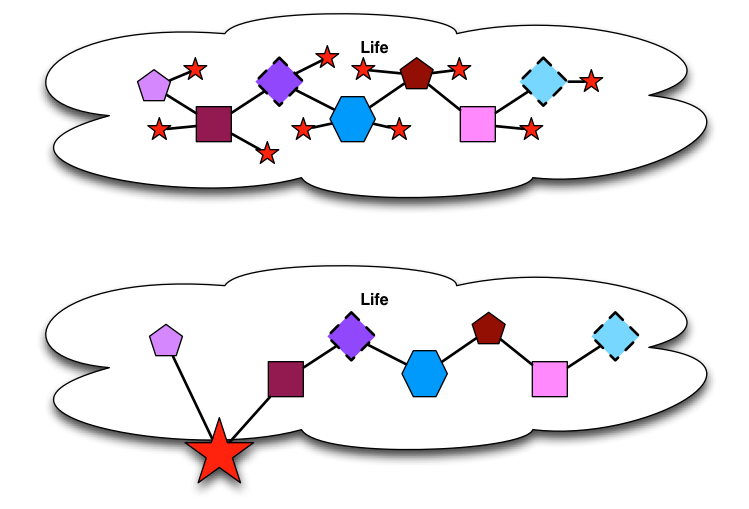I’ve been monitoring the comments on my #change11 posts, and rather than address them individually, I’m posting responses. So, a couple of questions have recurred about the slow learning concept. One is how the notion of quick small bites reflects a slower learning process. Another is how it might play out in the organization. And a final one is about the overall pedagogy.
 To address the first one, the notion is that the learnings are wrapped around the events in your life, not where you’re taken away from the context of your life to have a learning experience. I think of this as embedded learning versus event learning. Yes, it’s quick bits, but they don’t mean as much on their own as in their cumulative effect over time. Whereas the cumulative effect of the event model dissipates quickly, the distributed model builds slowly!
To address the first one, the notion is that the learnings are wrapped around the events in your life, not where you’re taken away from the context of your life to have a learning experience. I think of this as embedded learning versus event learning. Yes, it’s quick bits, but they don’t mean as much on their own as in their cumulative effect over time. Whereas the cumulative effect of the event model dissipates quickly, the distributed model builds slowly!
To address the pedagogy, it’s about having little bits of extra information that connect to the events in your life, not separate (unless the events in your life aren’t frequent enough, and then we might create little ‘alternate reality’ events that create plausible and fun scenarios that also provide the desired practice to develop you on the path. It’s not breaking up event-based learning into smaller chunks so much as wrapping around the meaningful events in your life, when possible.
And that pedagogy will very much be our choice. I do hope we can take the opportunity to include a sufficient level of challenge, and the opportunity to personalize it, rather than keep it generic. Consider minimalist approaches, weave in learning-to-learn, connecting people as well as providing additional information. For instance, we should be asking personalization questions afterward (whether via system or person). The algorithms hopefully will have some serendipity as well as relationships to my personal experience. Some elliptical material. This would support discovering new relationships in learning, as well, as we mine the effects of some random juxtapositions across many experiences.
How to make this practical in organizations worried about immediate productivity? In my experience, it’s already happening. Folks are (trying) to take responsibility for their learning. They take the social media cigarette breaks to go out and connect to their networks when the office blocks access through the firewall. They’re discussing work topics in LinkedIn groups, and using Twitter to both track new things and to get questions answered. The question really is whether orgs will ignore or hamper this versus facilitating it. That’s why I’m part of the Internet Time Alliance, where we are working with organizations to help them start supporting learning, not just offering training.
We do see small bits of moves toward slow learning, but I don’t like to assume everyone’s yet capable of taking ownership of it. And, yes, the sad state of the world is that typical schooling and old-style management can squelch the love of learning and not develop the skills that are needed. We have multiple challenges, and I’m just suggesting the concept of slow learning, a drip-irrigation versus flood metaphor, is a wedge to help drive us out of the event-based model and start addressing the issues raised: pedagogy, curricula, infrastructure, technology, politics, and more. The efforts to build such a system, I reckon, will force progress on many fronts. Whether it’s the best approach to do that is a separate question. I welcome your thoughts.
And a thanks to all for their participation this week, it’s been a learning experience for me as well!
Thanks, Clark, this fits really well with something I’ve been struggling with this week. Clients complain so heavily about learning events that take their employees ‘away’ from the work for a number of hours, days or weeks. Couple that with costs no one can afford for travel to in-person training and you have a ripe opportunity for slow-drip learning to take hold. So why are so many individuals and organizations still SO resistant to anything that doesn’t look like formal, event-based learning?
Hi, Clark and others
Wrapping learning around the events in your life, rather than fitting life around learning events is a very helpful way of thinking about what new technologies and attitudes enable. Rather than adjusting to the organization (educational, institutional, corporate), the organization can adjust to us, to daily life as lived. Although this seems radical (even threatening to traditional institutions and the people who have internalized their structures and ways of thinking), it is really a return to what is natural, normal, comfortable, and “real”. If we think about it, the separation of work/learning/life is not natural. It is just one approach that we developed to manage the complexities of an industrial society that was focussed on mass production and mass consumption. But we are no longer limited to the industrial model, and we are now acutely aware of the limitations (indeed, the dangers) of the production + consumption = growth model. We can step out of one construction of the world and enter another if we choose to do so. We can use current technologies to enable a healthy transition from a mindset that artificially separates living and learning into separate spaces and events, to a mindset in which life (and the world it is situated in) is seen as a more integrated whole.
Mark McGuire
Blog: http://markmcguire.net/
Twitter: @mark_mcguire